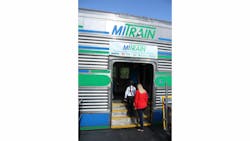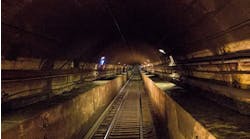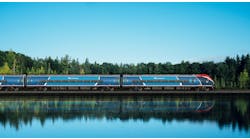A new technical study will begin the next phase of the process aimed at determining the feasibility of commuter rail between Washtenaw and Livingston Counties. Known as the “WALLY; Washtenaw and Livingston Line” by advocates of the service, North-South Commuter Rail is a long-range project being considered as a cost-effective alternative to ease traffic congestion along US-23 between Howell and Ann Arbor. The proposed commuter rail service would also provide economic development and job creation opportunities in the region.
The new phase will follow an earlier feasibility study that RL Banks conducted in 2008. It will be a more in-depth process that will include model-based ridership estimates, more detailed cost estimates, station locations, train storage and maintenance facility locations, and governance and funding feasibility considerations. The study will also include a review of possible alternatives, such as express bus service and high occupancy vehicle (HOV) lanes on US-23.
The study is being funded by a Transportation and Community System Preservation (TCSP) grant from the Federal Highway Administration and the Federal Transit Administration. While the TCSP grant requires a 20 percent match, these funds were collected in advance by the Ann Arbor Area Transportation Authority (TheRide) in partnership with local contributors. The study will not use any of the new tax funds from the recently-passed millages.
The study will be managed in cooperation with the Michigan Department of Transportation (MDOT) and will include a large public involvement effort, with plans for general public meetings and focused discussions with local elected officials, businesses, environmental groups, and other interest groups.
Larry Krieg, AAATA Board member, said, “It's exciting to see enthusiasm for north-south commuter rail build in both Washtenaw and Livingston counties. Not only are commuters eager to see an alternative to congestion on US- 23, but developers and businesses are looking at potential investments around the stations. This could be the beginning of a new kind of sustainable living for Southeast Michigan, based not solely on private vehicles, but with robust public options based on the fuel and operating efficiency of rail.”
David Walmroth, a local business owner and Board member of the Hamburg Historical Society said, "From easing vehicle congestion to enabling economic development, leveraging rail assets make sense. The beauty of the approach being adopted by the North-South Commuter Rail Study is that it includes casting a wide net for input while also detailing key costs. By actively soliciting input from businesses, government, and the public, the North-South Commuter Rail Study is taking a best-of-industry approach.”
The study will be led by Smith Group JJR, and is expected to take 18 months to complete. New conditions now exist, which were not available for the previous study, including recently upgraded track north of Ann Arbor, a fleet of 23 refurbished commuter railcars, support from the "Friends of WALLY" community group, and a change of railroad ownership in the city of Ann Arbor. The Ann Arbor Railroad, now owned by Watco, has expressed a willingness to consider passenger service on their rail line through the city.
Michael Lamb, Howell resident and Friends of Wally organizer, said, “We are very excited about this next step forward. It is nice to see that local governments, both in Livingston and Washtenaw Counties, have been working together to obtain the grant that helped make this possible. We look forward to the two counties taking the next steps to make North-South commuter rail a reality – a reality that is needed and wanted by the commuters using US-23.”


